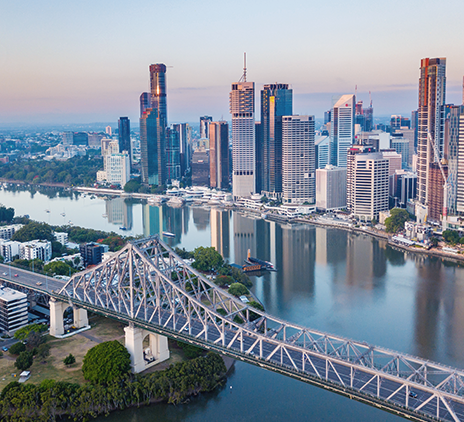- Market services
-
Compliance audits & reviews
Our audit team undertakes the complete range of audits required of Australian accounting laws to help you to help you meet obligations or fulfil best practice procedures.
-
Audit quality
We are fiercely dedicated to quality, use proven and globally tested audit methodologies, and invest in technology and innovation.
-
Financial reporting advisory
Our financial reporting advisory team helps you understand changes in accounting standards, develop strategies and communicate with your stakeholders.
-
Audit advisory
Grant Thornton’s audit advisory team works alongside our clients, providing a full range of reviews and audits required of your business.

-
Corporate tax & advisory
We provide comprehensive corporate tax and advisory service across the full spectrum of the corporate tax process.
-
Private business tax & advisory
We work with private businesses and their leaders on all their business tax and advisory needs.
-
Tax compliance
We work alongside clients to manage all tax compliance needs and identify potential compliance or tax risk issues.
-
Employment tax
We help clients understand and address their employment tax obligations to ensure compliance and optimal tax positioning for their business and employees.
-
International tax
We understand what it means to manage tax issues across multiple jurisdictions, and create effective strategies to address complex challenges.
-
GST, stamp duty & indirect tax
Our deep technical knowledge and practical experience means we can help you manage and minimise the impact of GST and indirect tax, like stamp duty.
-
Tax law
Our team – which includes tax lawyers – helps you understand and implement regulatory requirements for your business.
-
Innovation Incentives
Our national team has extensive experience navigating all aspects of the government grants and research and development tax incentives.
-
Transfer pricing
Transfer pricing is one of the most challenging tax issues. We help clients with all their transfer pricing requirements.
-
Tax digital consulting
We analyse high-volume and unstructured data from multiple sources from our clients to give them actionable insights for complex business problems.
-
Corporate simplification
We provide corporate simplification and managed wind-down advice to help streamline and further improve your business.
-
Superannuation and SMSF
Increasingly, Australians are seeing the benefits, advantages and flexibility of taking control of their own superannuation and retirement planning.

-
Payroll consulting & Award compliance
Many organisations are grappling with a myriad of employee agreements and obligations, resulting in a wide variety of payments to their people.
-
Cyber resilience
The spectrum of cyber risks and threats is now so significant that simply addressing cybersecurity on its own isn’t enough.
-
Internal audit
We provide independent oversight and review of your organisation's control environments to manage key risks, inform good decision-making and improve performance.
-
Financial crime
Our team helps clients navigate and meet their obligations to mitigate crime as well as develop and implement their risk management strategies.
-
Consumer Data Right
Consumer Data Right (CDR) aims to provide Australians with more control over how their data is used and disclosed.
-
Risk management
We enable our clients to achieve their strategic objectives, fulfil their purpose and live their values supported by effective and appropriate risk management.
-
Controls assurance
In Australia, as with other developed economies, regulatory and market expectations regarding corporate transparency continue to increase.
-
Governance
Through fit for purpose governance we enable our clients to make the appropriate decisions on a timely basis.
-
Regulatory compliance
We enable our clients to navigate and meet their regulatory and compliance obligations.

-
Forensic accounting and dispute advisory
Our team advises at all stages of a litigation dispute, taking an independent view while gathering and reviewing evidence and contributing to expert reports.
-
Investigations
Our licensed forensic investigators with domestic and international experience deliver high quality results in the jurisdictions in which you operate.
-
Asset tracing investigations
Our team of specialist forensic accountants and investigators have extensive experience in tracing assets and the flow of funds.

-
Mergers and acquisitions
Our mergers and acquisitions specialists guide you through the whole process to get the deal done and lay the groundwork for long-term success.
-
Acquisition search & strategy
We help clients identify, finance, perform due diligence and execute acquisitions to maximise the growth opportunities of your business.
-
Selling a business
Our M&A team works with clients to achieve a full or partial sale of their business, to ensure achievement of strategic ambitions and optimal outcomes for stakeholders.
-
Operational deal services
Our operational deal services team helps to ensure the greatest possible outcome and value is gained through post merger integration or post acquisition integration.
-
Transaction advisory
Our transaction advisory services support our clients to make informed investment decisions through robust financial due diligence.
-
Business valuations
We use our expertise and unique and in-depth methodology to undertake business valuations to help clients meet strategic goals.
-
Tax in mergers & acquisition
We provide expert advice for all M&A taxation aspects to ensure you meet all obligations and are optimally positioned.

-
Corporate finance
We provide effective and strategic corporate finance services across all stages of investments and transactions so clients can better manage costs and maximise returns.
-
Debt advisory
We work closely with clients and lenders to provide holistic debt advisory services so you can raise or manage existing debt to meet your strategic goals.
-
Working capital optimisation
Our proven methodology identifies opportunities to improve your processes and optimise working capital, and we work with to implement changes and monitor their effectiveness.
-
Capital markets
Our team has significant experience in capital markets and helps across every phase of the IPO process.
-
Debt and project finance raising
Backed by our experience accessing full range of available funding types, we work with clients to develop and implement capital raising strategies.
-
Private equity
We provide advice in accessing private equity capital.
-
Financial modelling
Our financial modelling advisory team provides strategic, economic, financial and valuation advice for project types and sizes.
-
Payments advisory
We provide merchants-focused payments advice on all aspects of payment processes and technologies.

-
Voluntary administration & DOCA
We help businesses considering or in voluntary administration to achieve best possible outcomes.
-
Corporate insolvency & liquidation
We help clients facing corporate insolvency to undertake the liquidation process to achieve a fair and orderly company wind up.
-
Complex and international insolvency
As corporate finance specialists, Grant Thornton can help you with raising equity, listings, corporate structuring and compliance.
-
Safe Harbour advisory
Our Safe Harbour Advisory helps directors address requirements for Safe Harbour protection and business turnaround.
-
Bankruptcy and personal insolvency
We help clients make informed choices around bankruptcy and personal insolvency to ensure the best personal and stakeholder outcome.
-
Creditor advisory services
Our credit advisory services team works provides clients with credit management assistance and credit advice to recapture otherwise lost value.
-
Small business restructuring process
We provide expert advice and guidance for businesses that may need to enter or are currently in small business restructuring process.
-
Asset tracing investigations
Our team of specialist forensic accountants and investigators have extensive experience in tracing assets and the flow of funds.

-
Independent business reviews
Does your company need a health check? Grant Thornton’s expert team can help you get to the heart of your issues to drive sustainable growth.
-
Commercial performance
We help clients improve commercial performance, profitability and address challenges after internal or external triggers require a major business model shift.
-
Safe Harbour advisory
Our Safe Harbour advisory helps directors address requirements for Safe Harbour protection and business turnaround.
-
Corporate simplification
We provide corporate simplification and managed wind-down advice to help streamline and further improve your business.
-
Director advisory services
We provide strategic director advisory services in times of business distress to help directors navigate issues and protect their company and themselves from liability.
-
Debt advisory
We work closely with clients and lenders to provide holistic debt advisory services so you can raise or manage existing debt to meet your strategic goals.

-
Business planning & strategy
Our clients can access business planning and strategy advice through our value add business strategy sessions.
-
Private business company secretarial services
We provide company secretarial services and expert advice for private businesses on all company secretarial matters.
-
Outsourced accounting services
We act as a third-party partner to international businesses looking to invest in Australia on your day-to-day finance and accounting needs.
-
Superannuation and SMSF
We provide SMSF advisory services across all aspects of superannuation and associated tax laws to help you protect and grow your wealth.
-
Management reporting
We help you build comprehensive management reporting so that you have key insights as your business grows and changes.
-
Financial reporting
We help with all financial reporting needs, including set up, scaling up, spotting issues and improving efficiency.
-
Forecasting & budgeting
We help you build and maintain a business forecasting and budgeting model for ongoing insights about your business.
-
ATO audit support
Our team of experts provide ATO audit support across the whole process to ensure ATO requirements are met.
-
Family business consulting
Our family business consulting team works with family businesses on running their businesses for continued future success.
-
Private business taxation and structuring
We help private business leaders efficiently structure their organisation for optimal operation and tax compliance.
-
Outsourced CFO services
Our outsourced CFO services provide a full suite of CFO, tax and finance services and advice to help clients manage risk, optimise operations and grow.
-
ESG & sustainability reporting
There is a growing demand for organisations to provide transparency on their commitment to sustainability and disclosure of the nonfinancial impacts of their business activities. Commonly, the responsibility for sustainability and ESG reporting is landing with CFOs and finance teams, requiring a reassessment of a range of reporting processes and controls.
-
ESG & sustainability advisory
With the ESG and sustainability landscape continuing to evolve, we are focussed on helping your business to understand what ESG and sustainability represents and the opportunities and challenges it can provide.
-
ESG, sustainability and climate reporting assurance
As the demand for organisations to prepare information in relation to ESG & sustainability continues to increase, through changes in regulatory requirements or stakeholder expectations, there is a growing need for assurance over the information prepared.

-
Management consulting
Our management consulting services team helps you to plan and implement the right strategy to deliver sustainable growth.
-
Financial consulting
We provide financial consulting services to keep your business running so you focus on your clients and reaching strategic goals.

-
China practice
The investment opportunities between Australia and China are well established yet, in recent years, have also diversified.
-
Japan practice
The trading partnership between Japan and Australia is long-standing and increasingly important to both countries’ economies.
-
India practice
It’s an exciting time for Indian and Australian businesses looking to each jurisdiction as part of their growth ambitions.
-
Singapore practice
Our Singapore Practice works alongside Singaporean companies to achieve growth through investment and market expansion into Australia.
-
Vietnam practice
Investment and business opportunities in Vietnam are expanding rapidly, driven by new markets, diverse industries, and Vietnam's growing role in export manufacturing, foreign investment, and strong domestic demand.

-
 Client Alert Government Grants in FY25As we embark on a new financial year, it’s crucial to take a strategic approach to understanding the government grants landscape.
Client Alert Government Grants in FY25As we embark on a new financial year, it’s crucial to take a strategic approach to understanding the government grants landscape. -
 Client Alert Consultation on foreign resident CGT rules commencesTreasury is taking steps to ensure fairer tax treatment for foreign resident investors by tightening Australia's foreign resident Capital Gains Tax (CGT) regime. Proposed changes aim to broaden the CGT base and enhance integrity, impacting infrastructure, energy, agriculture, and more.
Client Alert Consultation on foreign resident CGT rules commencesTreasury is taking steps to ensure fairer tax treatment for foreign resident investors by tightening Australia's foreign resident Capital Gains Tax (CGT) regime. Proposed changes aim to broaden the CGT base and enhance integrity, impacting infrastructure, energy, agriculture, and more. -
 Insight Australian wine export strategies post-China tariff removalFollowing the recent removal of tariffs on Australian wine by China, the industry is keen to rebuild relations and explore the right export markets. This presents Australian wine producers with a chance to reassess their position in the global market.
Insight Australian wine export strategies post-China tariff removalFollowing the recent removal of tariffs on Australian wine by China, the industry is keen to rebuild relations and explore the right export markets. This presents Australian wine producers with a chance to reassess their position in the global market. -
 Insight Cultivating innovation: A guide to claiming the R&D Tax Incentive in the Agribusiness sectorTo facilitate continued innovation in the Agribusiness sector, the Federal Government’s Research and Development Tax Incentive supports companies to undertake research and development activities that meet the eligibility criteria.
Insight Cultivating innovation: A guide to claiming the R&D Tax Incentive in the Agribusiness sectorTo facilitate continued innovation in the Agribusiness sector, the Federal Government’s Research and Development Tax Incentive supports companies to undertake research and development activities that meet the eligibility criteria.
-
Renewable Energy
Transformation through energy transition

-
Flexibility & benefits
The compelling client experience we’re passionate about creating at Grant Thornton can only be achieved through our people. We’ll encourage you to influence how, when and where you work, and take control of your time.
-
Your career development
At Grant Thornton, we strive to create a culture of continuous learning and growth. Throughout every stage of your career, you’ll to be encouraged and supported to seize opportunities and reach your full potential.
-
Diversity & inclusion
To be able to reach your remarkable, we understand that you need to feel connected and respected as your authentic self – so we listen and strive for deeper understanding of what belonging means.
-
In the community
We’re passionate about making a difference in our communities. Through our sustainability and community engagement initiatives, we aim to contribute to society by creating lasting benefits that empower others to thrive.
-
Graduate opportunities
As a new graduate, we aim to provide you more than just your ‘traditional’ graduate program; instead we kick start your career as an Associate and support you to turn theory into practice.
-
Vacation program
Our vacation experience program will give you the opportunity to begin your career well before you finish your degree.
-
The application process
Applying is simple! Find out more about each stage of the recruitment process here.
-
FAQs
Got questions about applying? Explore frequently asked questions about our early careers programs.
-
Our services lines
Learn about our services at Grant Thornton
-
Current opportunities
Current opportunities
-
Remarkable people
Our team members share their remarkable career journeys and experiences of working at Grant Thornton.
-
Working at Grant Thornton
Explore our culture, benefits and ways we support you in your career.
-
Current opportunities
Positions available.
-
Contact us
Get in touch
If the government’s economic outlook last week tells us anything, it’s that we need to be realistic about the Australian economy.
When the GFC hit in 2008, trade slowed down but as a nation we were able to avoid a recession. The Government threw stimulus at the challenge when access to capital dried up. This time around, there is no avoiding a recession – and given the numbers touted last week, perhaps even a depression. However the Government, Reserve Bank of Australia and financial institutions have banded together to ensure there is liquidity in the market to help keep the gears grinding. It’s a different kettle of fish.
In this podcast, Said Jahani, National Managing Partner of Financial Advisory, discusses what happens when the ‘sugar hit’ of government stimulus and early access to superannuation currently swirling in the economy dissipates, and what he hopes the Australian economy will look like in five years’ time.
Available on Apple Podcasts, Spotify or within your browser
Podcast transcript
Velvet-Belle Templeman
Welcome to Boardroom.Media. I'm Velvet-Belle Templeman, and you're listening to Grant Thornton's Navigating the New Normal podcast series. Today I’m here talking to Said Jahani National Managing Partner of Financial Advisory at Grant Thornton. Said specialises in turnaround and corporate restructuring and is here talking about the state of the Australian economy. With the Federal Government handing down their economic statement last week, including revisions to a new, more targeted version of JobKeeper what does this say about Australia's recovery out of an economic recession?
Thanks so much for joining us again, Said.
Said Jahani
Thanks for having me.
Velvet-Belle Templeman
Now Said, the update from the Treasurer last week wasn't good. We're facing the biggest deficit since World War II. Unemployment rate is heading to 9.2% by December. We're already seeing parts of the country declared as hotspots and locked down. What does this mean for Australia's recovery out of recession?
Said Jahani
I don't think we're looking at a V-shaped bounce and when you see second outbreaks and lockdowns, like the one in Victoria, it is really difficult to see how we can recover from this really, really quickly. Let me explain what I mean by that. So most people know that the definition of a recession is two consecutive quarters of negative GDP, and we have that. So we are in recession and everyone knows that. Even during the GFC, we managed to actually avoid the technical definition of recession. So you'd have to actually go back some 30 years, back in 1990/91, since the country was actually in a recession. What most people don't know is what the definition is for a depression and whilst there’s some conjecture around this, it's broadly accepted that the definition of a depression is two consecutive years of negative growth and that is what the Treasurer outlined last week. The estimated GDP will shrink by half a percentage in the FY20 financial year and then will shrink again by 2.5 per cent in the current financial year, 2021.
Now the government’s response package totals some $174 billion over the next couple of years, plus balance sheet support. I mean, if you think about it, it is literally throwing the kitchen sink at this problem to try to solve. And now on top of that, you see state and territory governments also announcing their own separate relief packages. Plus, you have early access to superannuation both last financial year, $10,000 per member, and this current financial year, $10,000 per member, which has also injected another $100 billion dollars into the economy. Add all that together, there is a lot of money currently swirling around the economy, and that will stay around for the short term. When I'm actually speaking to many businesses at the moment, yes, they took a hit during the first lockdown and for those unfortunately enough must now face a second lockdown in Victoria have taken another hit, but those who have come out of it are actually rebounding reasonably quickly, even in states that have had the biggest hits, which is tourism and hospitality. There is pent up demand and thanks to the stimulus and the access to super consumers still have cash they want to spend.
So in my mind, the bigger issue around the recovery is what will happen when all this sugar hit and this money that's been swirling around currently runs out, which I think will occur in the next six to 12 months. and that's where I think the treasurer has obviously forecast the depression. The key factor around that is that the recovery will take longer and be harder.
Velvet-Belle Templeman
So clearly this particular recession is different from previous ones. And am I right in saying that if not for the pandemic, we wouldn't be in a recession. What's the sentiment like in the business community?
Said Jahani
Yes, I think you're right, and we'd been growing moderately as a nation around about 2.5 per cent GDP. I think we were forecast to do the same again in the current financial year, we've just come into. Obviously, the closest thing that we've had to a recession in recent times is the GFC some 12 years ago, however, the GFC was characterised by a significant absence of credit availability where financial institutions were reluctant to lend to each other. And then that had a knock-on impact to businesses who were then starved of capital and liquidity. The government's tried to address this early on in the current pandemic by providing its balance sheet to support liquidity to businesses via the banks, as well as working with both APRA and the RBA to relax some prudential regulations to again, encourage banks to provide ongoing liquidity.
I mean, in my mind when I look at the differences between say, the GFC and the current crisis, you know, yes we saw some large financial collapses during the GFC, think of Babcock & Brown and Allco, just to name a couple, but most of these collapses didn't actually impact the average consumer or business. So after the fallout from the GFC, whilst it was significant, it was reasonably limited. Whereas in this case, given the health crisis that has gone hand in hand with the economic crisis, there's not one single consumer or business that will be left untouched from this crisis and as a consequence, the ensuing economic crisis. So because of that more far reaching impact, I think, as I said before, the consequences will last for a lot longer and take a lot longer to also come out of the other end.
Velvet-Belle Templeman
And Said, compared to what we're seeing in other countries, how do you think Australia is faring in balancing health and economy?
Said Jahani
Look, it's not an easy job, you know, in terms of what the government's got to do here. My assessment, I think, they’ve done a reasonably good job. The government has come out quite early on and said that they would not pursue an elimination strategy in relation to COVID because economically it just would be too dire for the country to try to do that. So it had to always balance the opposing forces and I think most businesses have had a similar challenge. So look, I think, you know, especially when you look at yes, there's the second outbreak, but if you look at our health mortality rates and infection rates, we are still well below a number of other developed countries in the world and our economy hasn't fallen off a cliff in the same way others have where they've taken the more dire approach of complete lockdowns and shutdowns.
In fact, when you think about Josh Frydenberg's presentation last week, he compared Australia to countries like France, who did go down that hard lockdown and have got a bit of buyer's remorse where I think he quoted the French President saying they would not go down that path if there was a second outbreak again. Probably the only other thing I'd add is there are some examples in countries like Denmark, you know, who did adopt benefits to employers to retain and continue to pay their workforce rather than make them redundant, but they linked some of those payments to retraining and education campaigns as well. So rather than employees being paid so to speak, you know, to watch Netflix, you know, over a period of time, there was a requirement for them to reskill or up-skill, or do more education to try to create an incentive for further productivity and efficiency gains in the long term, which, you know is not a bad idea when you stand back and look at it from afar.
Velvet-Belle Templeman
Now it's been made clear and it was made clear again last week that the number one priority for both state and federal governments is to create more jobs. How do you do that when you're dipping in and out of lockdown?
Said Jahani
It's not easy and the government has flagged this issue. You know, my first, second and third answer would be creating more flexibility in that industrial relations framework. You know, the first thing most employers want to understand is at the moment, whether the current temporary changes that were introduced when JobKeeper was first announced to our industrial relations laws will be extended past their September, expiry. These were the changes that increased flexibility around how employees can stand down parts of its workforce, reallocate job descriptions, job roles. And when I speak to a lot of businesses, those changes, and that flexibility has been just as important as a number of the other initiatives that the government introduced over that time. Having said that it is obviously only a band-aid, and you might recall, with a bit of fanfare, the government announced a reform agenda on the IR framework about a month ago, which would involve a collaboration between both sides of politics, the trade union movement, business groups.
But we haven't heard much more since that big announcement and I’m obviously keen to understand how this develops sooner rather than later. And then perhaps another way to think about how else the government can look to create more jobs. If I just take an industry lens to that question, I just picked two sectors. And again, in fairness to the government, they have already earmarked both of these sectors for support, but they are infrastructure and construction, both have large capacity to create jobs. So if you think about construction and the multiplier effect from investing in the construction sector is massive as it ripples across multiple sectors across the economy from, if you just think about, you know, building a house from the raw materials, the professional services and the retailer you need at the end of that supply chain to furnish that house. It has, as I said before, this massive multiplier effect, similarly, on infrastructure from a productivity perspective, the efficiency gains from having a strong infrastructure agenda are massive. Now we've underspent in that area, across the nation for decades. And, you know, we are, at a roaring pace trying to catch up as a consequence, but as I said, the benefit of increased efficiency and productivity for the economy from investment into infrastructure, will, I think also play an important role in our recovery.
Velvet-Belle Templeman
And Said, will the jobs be the same as they were before? Or has the pandemic highlighted some gaps or opportunities for new roles and services? Where are the bankers and lenders placing their bets?
Said Jahani
Look, I think a lot of businesses will eventually see a return to normal or what I call a new normal which will be a matter of time. The new normal is, yes, we will return to a level of trading, not dissimilar to pre-COVID, but depending on what sector you're in and you operate in, you know, it may stabilise at a level below or above where you were pre-COVID depending on the circumstances. So, the best example that a lot of businesses perhaps can relate to and I'll put my hand up as well in this category, you know, you might jump on a plane to go from Sydney to Melbourne for a two or three hour meeting face to face, and then jump back on a plane or stay the night and come back to Sydney. Now, I think we've all learnt through the lockdown that with the benefit of technology, a lot of those meetings don’t need to happen face to face and there always will be some that need to happen face to face. But, you know, you can actually run a lot of those meetings using technology.
So there will be a new normal around some of that sort of stuff, which will affect aviation, transport, restaurants, accommodation, but by the same token, you know, there are winners. And if you talk about where would I be putting my bets? Well, let's look at some of these technology providers who have provided a massive, and played a massive role in helping facilitate business during the lockdown. So whether that's things like Zoom or Teams or Skype, there's been a massive role for technology usage and then, you know, the consequent hardware that goes behind that. Similarly, if you talk to retailers, yes bricks and mortar have taken a hit, but most retailers have seen a massive spike in the online. So, you know, there are investments going into those areas and that's probably where, you know, there'll be more job creation.
Velvet-Belle Templeman
And finally, we’re a bit over four months into the pandemic now with no real way of knowing how long things will last, but where would you hope to see the Australian economy in say five years' time?
Said Jahani
I would well and truly hope that we would have fully recovered from this crisis if the economy can, by that stage, be back to, or slightly above where it was pre COVID-19 from a growth unemployment perspective, then I think that will be a success. We will still be stuck with an overhang of debt, which it will take time for us to pay off, that's from a government perspective. But also, I think from a business perspective. Businesses may be in the same situation having had to borrow to increase their liquidity and their buffer as a consequence, they may still be repaying the last remnants of that additional support back. But the government have made it clear, it wants to grow its way out of this crisis, which in my mind means no more tax hikes to try to repay back the borrowings. I think that that's the right approach by providing more incentive for businesses to invest and giving them the confidence to invest and grow, that's what will create jobs and hopefully profitability and that is the way for the government to increase its tax take in a more efficient manner, as opposed to increasing just marginal personal income tax rates or corporate tax rates. In fact, that's how Grant Thornton is approaching the future as well. We want to grow our way through this and help our clients in the process.
Velvet-Belle Templeman
Said, thank you for your time.
Said Jahani
No problems. It's been a pleasure.











































